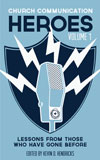I’m probably not alone when I say I started reading C.S. Lewis in college. I was a freshman at a secular university taking a handful of honors liberal arts classes. The professors were brilliant, and the books they had us read were tough, but fascinating. I was learning about Plato, western civilization in medieval times, and the cognitive development of our human brains. Every day I left class feeling invigorated, on top of the world…
Meanwhile, church was a bore. I went to services alone, the songs were cheesy and our 60+ preacher gave a sermon each week that was only slightly tweaked from the week before.
C.S. Lewis is who gave me—and countless others—permission to think about my faith. To ask questions. To wonder what all the beauty, truth and goodness in the world had to do with God and with me. Lewis wrote stimulating apologetics, poetry, chronicles about magical creatures, letters to dear friends, an autobiography and so much more—all to challenge and build up faith.
Other Faiths
I had wondered what I should think about all of the world religions, and he wrote, “If you are a Christian you do not have to believe that all the other religions are simply wrong all through,” (Mere Christianity). Whew, I thought. What a relief!
“But of course,” he continued, “being a Christian does mean thinking that where Christianity differs from other religions, Christianity is right and they are wrong.” Oh, I sighed. I’ll have to think about that…
Embracing Humanity
On the days when I enjoyed working out or eating dinner with friends more than reading my Bible, Lewis was a comfort to me. “Is our flesh really that bad?” I wondered.
“Christianity,” Lewis wrote, “is almost the only one of the great religions which thoroughly approves of the body—which believes that matter is good, that God himself once took on a human body…” (Mere Christianity)
Dealing with Grief
When I suffered real grief, Lewis agonized with me: “It is hard to have patience with people who say ‘There is no death’ or ‘Death doesn’t matter.’ There is death. And whatever is matters. And whatever happens has consequences, and it and they are irrevocable and irreversible. You might as well say that birth doesn’t matter,” (A Grief Observed).
Why a is C.S. Lewis a Communication Hero?
It was all very deep, but it was also reasonable. Lewis wasn’t shocked, offended, or threatened by my questions. He led me right up to them, spoke with authority and then gave me something to think about.
There are people in our pews today who are bored. Who have questions. It’s not necessarily that they think what Christianity offers is wrong or bad. But nothing in the church, which should be the hub of faith, speaks to them. Maybe they’re artists, and all the graphics we use are lame. Or they’re intellectuals, and we’ve got typos on our bulletins. They might actually want to know what the Bible has to say, but our pastors are only preaching warm and fuzzies.
What’s your church’s story? Are you asking the tough questions and making your congregation think? Or are you communicating a shallow gospel?
C.S. Lewis was an atheist for 32 years before finding his faith. Over time, he built relationships with a lot of loving, intelligent and interesting Christians who took the time to tell Lewis the story of Christianity in beautiful ways. Through friendship. Through poetry. Through deep and meaningful conversation, food, wine, books, reasonable and reverent doctrine, and more. And then Lewis went on to do the same for so many more people, like me.
Our churches should be imitating this kind of solid, honest communication.
 More:
More:
- Learn more about heroes in our ebook, Church Communication Heroes Volume 1: Lessons From Those Who Have Gone Before.
- Check out other heroes in our Church Communication Heroes series.





Abe
February 15, 2012
Thanks Erin. As a pastor it is easy to get complacent with trying to provide simple answers to a complex world. You (and C.S. Lewis) reminded me that it’s not so much the simple answers and shallow gospel stories that people are seeking. People need a place to ask the tough questions and experience the deep richness of the gospel in hopes of being transformed. I will be rethinking my sermons in the coming months to consider your insights.
Frank Viola
February 24, 2012
Really appreciate this post. Love Lewis.